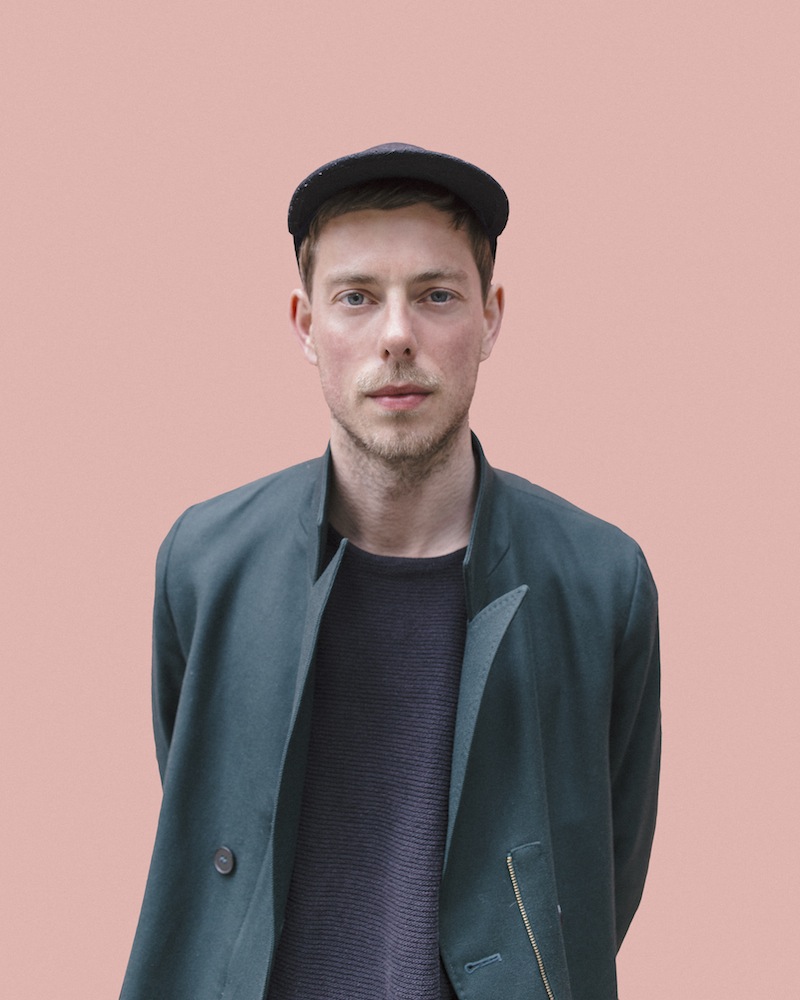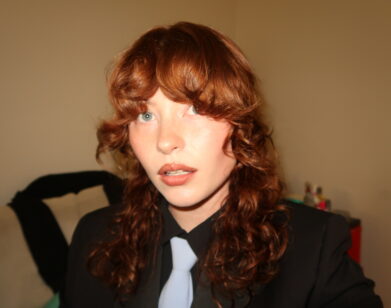Sören Juul Faces Fear

ABOVE: SØREN JUUL. PHOTO COURTESY OF LUCA VENTER.
For the last five years, Søren Juul has lived out of a suitcase, spending months in cities around the United States and embarking on tours around the world with the likes of Julia Holter, Beirut, and Perfume Genius. Last summer, however, he bought a house near the sea in Svendborg, Denmark, where he’s spent time in solitude, returning to his introspective roots. On June 17, Juul will release This Moment (4AD), an album that acts as a culmination of the past few years and one comprised of beautifully melodic and poetic songs.
“I’m able to concentrate on having music in my life,” he says of finding a permanent place to live in Svendborg. “I’m not interrupted and that’s a privilege. I’m constantly in a flow of thinking and creating creative thoughts.”
Last month, the Danish musician and composer spent five days in New York and one evening we saw him play an intimate set at Electric Lady Studios. With just him and the grand piano, Juul’s speaking was sparse between songs, allowing listeners to become fully immersed within his personal world. Unlike Somewhere Else, his debut full-length released in 2013 under the name Indians, in This Moment Juul focuses on living in the present, revealing deeper layers of himself, and below we are pleased to premiere a live video for one of the album’s standout tracks, “Push Me Away.”
“It’s a love song and about the fear of having things too close,” Juul says. “I think everyone knows about this situation—you protect yourself, but what do you protect yourself from? From love, or from being hurt in the future?”
The day after his performance at Electric Lady, we met Juul to discuss dropping the moniker Indians, the concept of fear, its translation in his music, and more.
EMILY MCDERMOTT: I read that you lived in New York and Portland during the last four years. How long were you living here in New York?
SØREN JUUL: I wouldn’t say I was living here because I didn’t move anything. I was out of my apartment in Copenhagen in October 2012 and since then I haven’t had any place to live. I’ve basically been living out of my suitcase. Whenever I was in Denmark I stayed with friends. I was always leaving, so it felt wrong to find a permanent place. Instead, I would just decide to stay in Oregon or in New York for a couple of months. Then I would go on a tour and then I would come back. It was this fantasy of getting closer to the American culture and staying for long periods of time. People are very outgoing, easy to meet and talk to in New York and different cities around America. There’s this great optimism and people in America are hardworking. Denmark is very secure in many, many ways. It’s a secure society, kind of like a fairytale country.
MCDERMOTT: So when and how did you decide to move to Svendborg?
JUUL: June 2015, almost a year now. Moving to Svendborg was a decision based on not living out of a suitcase anymore. I had been in Copenhagen for 12 years and I was renting this really nice apartment, but it was on the fifth floor and seriously, I only used the city for a good cup of coffee and a cinnamon roll. I was like, “I can find a good cup of coffee and a cinnamon roll somewhere else.” [laughs] I wanted to get close to nature and more space. The moment that I realized “I’m opening my door and have my feet on the ground without having to go down several stairs, I’m walking out here in my t-shirt and shorts and picking berries from the bushes to put on my yogurt for breakfast,” I was like, “This is a dream a come true.”
MCDERMOTT: Last night you mentioned that you went swimming in the ocean at least twice everyday.
JUUL: Sometimes even three times a day. It is the most beautiful ocean I’ve ever been around.
MCDERMOTT: I imagine it being such a drastic shift, going from this nomadic lifestyle for four years to this kind of remote isolation.
JUUL: Well, traveling around the world, meeting people and leaving them behind all the time, is also very isolating. Part of being a musician and an artist is that you spend a lot of time on your own. That’s where you have time to think and create thoughts that might be something you can share in the future. Honestly, when I went to Svendborg, I sat for a month and a half without any music on, without anything. I could just sit and do nothing, walk around. I really needed it. I didn’t think about it, but I think my body and mind told me, “You need to do something to stimulate yourself differently, or maybe you don’t need stimulation for a while.”
MCDERMOTT: So what led you to drop your moniker Indians and use your real name for this album?
JUUL: Different reasons, but when I started writing music, it was imagination and creating this world around a project. I could pretend to be someone else. With the traveling and intense tour experiences that I never had before, I grew with it and wanted to stand up with my own name. I don’t have to protect myself or hide. I like the idea of challenging myself all the time. I thought for this album it would be a fresh start with a new name, but I still think the two records are in a brother-sister relationship. I didn’t change my way of writing music, of making music; it’s not a different project. I will always write and record music the way I do. Going by Indians was the easy way, but the easy way is usually not the solution. It takes hard work to make things happen.
MCDERMOTT: And what is that way?
JUUL: I don’t think that much about it. I’m making my decisions with the taste and intuition that I have. Usually I will have a melody and chords pretty fast in the process, then the lyrics are some kind of reflex—I’ll be jamming around and words will come out of my mouth. Some of them make sense and some of them don’t. It’s building word by word, or sentence by sentence. For instance, I’m working on a new song and I have the whole structure, but no lyrics. When I thought about the chords, a lyric line just came out—”Heard the news now you’re in town”—and that’s how the song’s going to start. I don’t know the rest of the story yet, but that’s usually how it goes. Then I have to focus on writing the story behind “Heard the news now you’re in town.”
MCDERMOTT: On this album you focus on living in the present, rather than the past or future, and you’ve previously said something about how being afraid prevents us from living in the moment. What are you afraid of that prevents you from being present?
JUUL: My phone, my computer, it’s distracting me all the time. It makes a lot of things easier, but I would love to not have it around, and feel, see, and do stuff like I did when I was a kid. It was a flow of experiences; now I get interrupted, people get interrupted all the time. I walk outside and I don’t know my way around, so I’ll look down at my phone every second to figure out where I am. It’s challenging and I think it’s very unhealthy.
MCDERMOTT: You miss everything going on around you. I have a rule with certain friends: We’re not allowed to look at our phones while hanging out.
JUUL: I did that too when I had a band with me. I said no phones, computers, or social media for a half an hour before the show, because where’s your mindset if you check your Facebook or Instagram five minutes before we go on stage? It’s going to do something to your concentration and your focus. That’s a challenge and I think a lot about it. There are many moments during the day when I’m like, “What the fuck are you doing? Be present. Focus. Concentrate.” Fear in general is not a good thing to walk around with, so I really try not to.
MCDERMOTT: That’s much easier said than done.
JUUL: Yeah, I know. There’s fear behind every thought. You have fear, then you have hope, and then there’s something in between. So what would you choose? Would you choose you live your life based on fear? Or would you choose to live your life based on love? I believe in love. You can spend a lot of time being afraid, and maybe you don’t have to be afraid of whatever it is. If you’re afraid of it, then maybe things start going wrong. It’s an entity, I think.
MCDERMOTT: So what helps you face your fears?
JUUL: I really need to spend time by myself. The most important thing is that I don’t have to be afraid anymore, because I know I can take care of myself. I’m not dependent or relying on people. I used to, too much, but I’ve been focusing the opposite way around so I know I can count on myself; I have myself no matter what. Maybe it sounds a little weird, but you can easily get confused about everything in the world. You can think about why people do this, why is there a war going on here, and why is everything…? But it’s not your responsibility. You can’t control it so let it go.
MCDERMOTT: Translating that feeling to writing your music, when you feel like you’ve finished a song, do you show it to anyone? Or do you think, “This is my song and I’m done”?
JUUL: I like play a song for friends and ask what they think. You need critique at a certain time. In the creating process you don’t need people to tell you what is good; you need people to tell you what is bad. Sometimes you need feedback from different people. You collect inspiration to solve a song mystery: How do I make this little project come to life?
In the process of recording and writing these songs, each song had its own personality. I would look at it like a person that I had to dress up—what kind of personality does this song have? What kind of shoes, what kind of trousers? Does the song wear shorts? Does it wear a jacket? I want to be true to the identity of the personality of the song. Maybe the song “Soul Seeker” is a suit with a t-shirt. [laughs] It’s a heavy song, so the suit is serious, but not too serious, and that’s why it’s a person with a t-shirt.
MCDERMOTT: On a different topic, can you tell me about the album art?
JUUL: I had this vision of the album cover, especially the color. I really wanted certain colors from the beach and ocean where I live. There’s a special light. No matter where you go in the world, we share the same sky but the light is different. The stones on the beach have this special grey and green-ish color. I collected a bunch of stones and mailed it to the in-house designer who I worked with closely for the cover. I sent him, by mail, an envelope full of stones from the beach to explain the colors.
MCDERMOTT: You also wrote a song for The Fault in Our Stars, which has such a special soundtrack. How was writing for a movie different than writing for yourself?
JUUL: I had to do research. I couldn’t see the movie, but I got a short script and as told what it was about. I got the 35-second clip and it was like, “Compose something from here to here,” and that was it. It was fun, but it was a challenge, too. I was traveling at the time, so I was not around the studio. I had to make a really, really scratch demo to send in. It was recorded in Los Angeles somewhere, on a piano out of tune.
MCDERMOTT: Have you ever thought about composing a full score?
JUUL: I would love to do that. That would be a really big challenge, and I like working in long projects like that—just like an album. I will always make albums because it’s a brilliant project and a good learning experience. To do instrumental pieces or scores for some kind of movie and have a close working relationship with the director would be interesting, kind of like a dream come true.
THIS MOMENT WILL BE RELEASED ON JUNE 17, 2016. FOR MORE ON SØREN JUUL, VISIT HIS WEBSITE.






